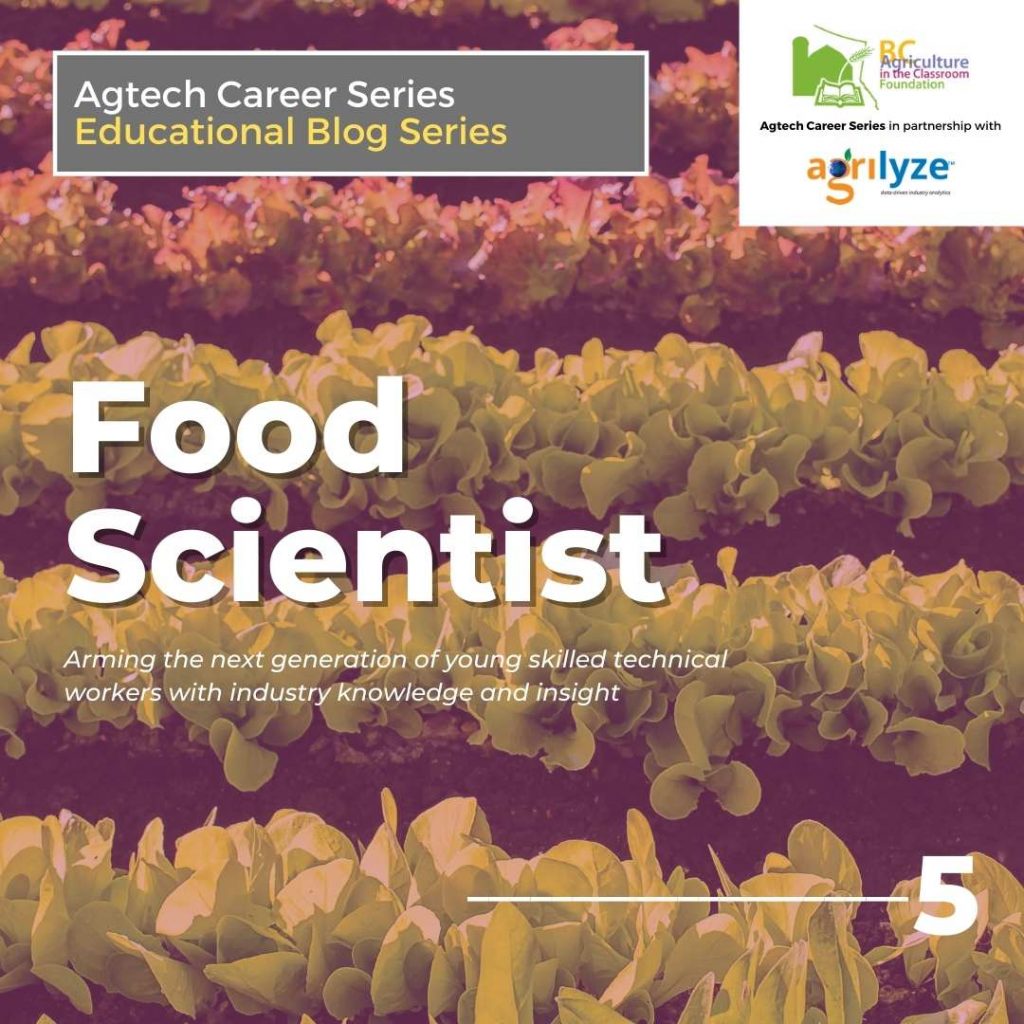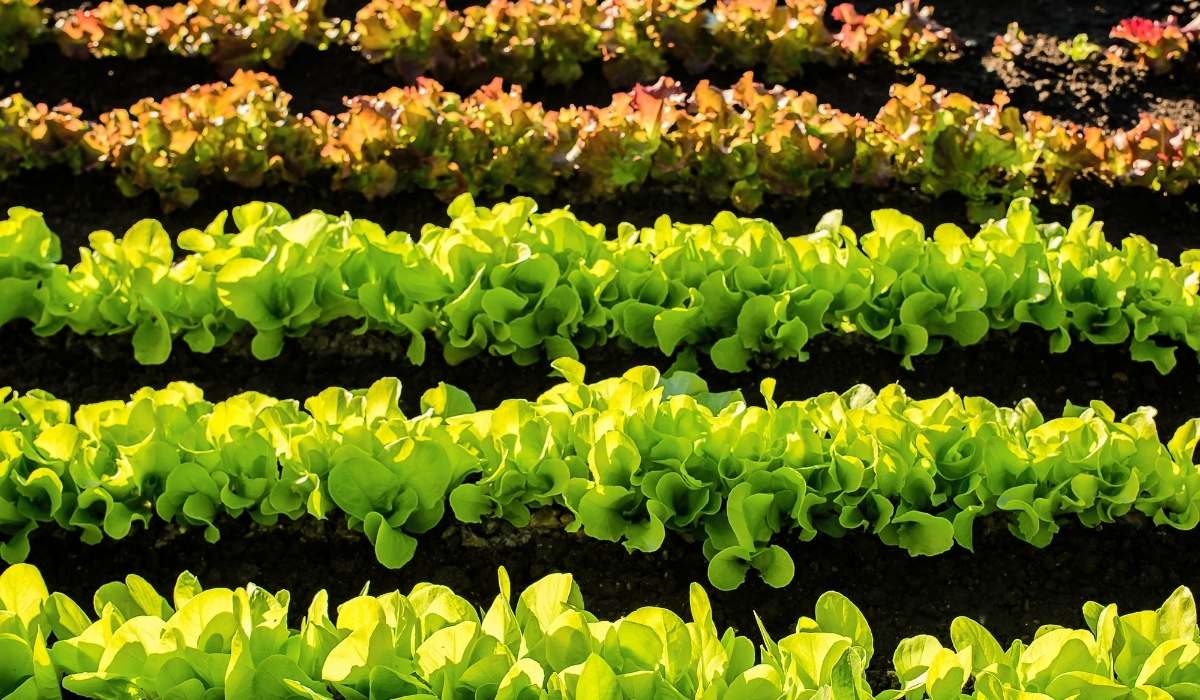Agtech Career Series: Career 5 – Food Scientist
There has never been a better time to help our planet thrive. In farming, we can promote health, wellness, and food accessibility by innovating and finding new approaches to feeding a growing population. We should work toward creating safe, nutritious, delicious and sustainable food. Food science allows us to analyze, track and understand the way our food systems work. It’s a field that has been around for centuries and today has helped us to reduce food waste and our environmental footprint.
As a multi-disciplinary field, food science involves nutrition, chemistry, biochemistry, engineering and microbiology to promote scientific knowledge that can help food scientists uncover real-world problems related to the food system. Many farmers actively adjust their traditional methods to incorporate cutting-edge innovations into their practices and work together with food scientists to help mitigate environmental issues like climate change.
So, a food scientist, or more precisely, agricultural food scientist, is a kind of scientist specializing in analyzing farm methods and food production practices that will help farms increase their yields and improve food safety and other factors.
To contribute in this manner, the scientist will conduct experiments, then analyze the data found. They often use their findings to create new and innovative ways to augment agricultural output or improve the quality of our food supply. A lot of their work involves visiting farms and other sites to get samples. Then they must communicate their findings to their clients, which includes farmers, members of the scientific community, and at times policy-makers. In a lot of cases, an agricultural food scientist can lead and coordinate important food-related research.
Agricultural food scientists play a vital role in maintaining and expanding our nation’s food supply. Whether through basic research that helps them understand essential processes by which crops and livestock grow or applied research that is more focused on discovering new ways to improve the quantity, quality, and safety of agricultural products, agricultural food scientists are very much in need.
Some other aspects of the role include:
- Studying the deterioration and processing of foods
- Determining food nutrient levels and analyzing their content
- Looking for new nutritional food sources
- Studying farm crops and animals
- Studying environmental factors that impact crop production, pasture growth and breeding
- Studying the effects of cultivation techniques, insects, soils, and plant diseases on crop or animal production
- Developing ways to conserve water and soil
- Advising farmers and managers on innovative strategies that can improve production
- Investigating the best and most economical ways to make food taste good, healthy and safe
Much of their experiments will be applied toward developing, processing, packaging, preserving, distributing and storing food. When it comes to raw ingredients such as produce from a farm, agricultural food scientists check for maturity and stability to ensure that the fresh products meet the required quality standards and nutrient values. They will also contribute toward ensuring that sanitation and waste management standards are up to par with government regulations.
There are generally five main areas that food scientists work in:
- Research – study and analyze the structure and composition of food, its production and any changes that food may undergo during processing and storage. For example, they might develop new protein sources or study food attributes that affect its flavour, appearance or texture.
- The Process of Food and its Development – instigate new processing methods and ways to create safer and healthier food. They will often work closely with others involved in growing and selling food to evaluate how well their processes function and how the food can be better geared toward its primary customer.
- Quality Assurance – check raw food for stability and maturity, as well as for safety, quality, and nutritional value. They may be involved in developing quality assurance programs while also working with third-party groups to inspect farming operations, develop and improve storage methods, or do food analysis.
- Processing – develop product specifications while scheduling and evaluating processing operations and working closely with engineers and farm operators.
- Regulatory – audit or inspect food-processing operations and might investigate outbreaks brought on by the foodborne illness. In that case, they would have to coordinate recalls.
As an agricultural food scientist, your primary functions will be to:
- Design, execute and interpret experiments to develop and optimize food
- Understand processes and equipment to create practical solutions
- Identify, research and implement new methods to help reduce costs, improve productivity, quality and ROI
- Document requirements for food processes, specification for materials and finished goods
Skills & attributes needed:
- Organized
- Inquisitive
- Good communication and public speaking skills
- Works well on a team
- Has creative problem-solving skills
- Excellent interpersonal skills
- Interested in farming
- Passionate about science
- Observant
You should enjoy:
- Synthesizing data from a wide range of disciplines to develop innovative approaches to problems
- Using specific equipment and instruments to perform tasks
- Supervising other team members
Agricultural food scientists usually work in offices, labs, and processing plants. Those working in processing plants may be required to work shifts that include evenings, weekends and holidays.
To enter this field, you require a 4-year bachelor’s degree or even a master’s or doctorate in a related discipline such as technology, biochemistry, chemistry or microbiology. These degrees include coursework in microbiology, chemistry and engineering as you will be analyzing the principles of food deterioration and processing, as well as its nutritional profile.
Overall, food scientists are versatile, collaborative and interdisciplinary practitioners committed to advancing the field of food science, ensuring an abundant and safe food supply while contributing to better health for everyone on the planet. Would you consider taking on this profession? If so, know that you would be making a huge difference!
How Agrilyze Can Help
- Studying farm crops and animals
- By leveraging Agrilyze, food scientists can track information about crops and animals in a single place and overly that data with other relevant information to build correlations and relationships.
- Studying environmental factors that impact crop production, pasture growth and breeding
- Leveraging IOT device data loaded into Agrilyze allows food scientists to manage detailed information related to crops and animals. Soil moisture sensors can track that crops have the appropriate irrigation, or weather stations can track when frosts are potential or barns are too hot.
- Studying the effects of cultivation techniques, insects, soils, and plant diseases on crop or animal production
- One of the keys to studying information is tracking it over time so changes can be analyzed and compared. Agrilyze’s database is there to allow this to happen. Once that data is there, food scientists can use analysis tools (AI) to determine patterns or mitigation strategies.
- Developing ways to conserve water and soil
- Agrilyze allows for tracking weather, soil, and water information that can be used on maps or in analysis tools to help food scientists make informed decisions.
- Advising farmers and managers on innovative strategies that can improve production
- Managed data allows for clear presentation of information to improve production, decrease costs or mitigate impacts.
- Determining food nutrient levels and analyzing their content
- Leveraging tests of food nutrients and cross-referencing them to other farm-related data allows food scientists to make informed decisions. Agrilyze provides the tools to store, manage and analyze this data.
View Agtech Career 5 – Food Scientist Info Sheet



